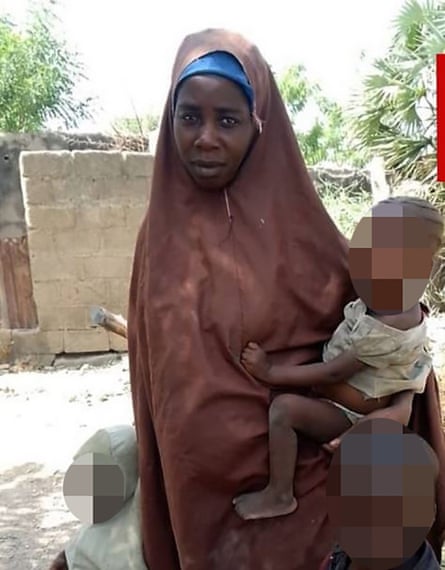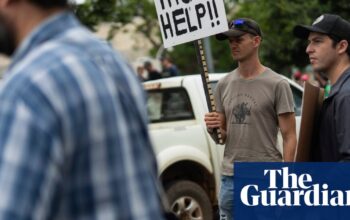Nigerian troops have rescued a pregnant woman and her three children 10 years after she was abducted by Boko Haram militants when she was a schoolgirl in the town of Chibok.
Lydia Simon was rescued in Gwoza council area, about 95 miles (150km) east of Chibok, from where 276 schoolgirls were seized in April 2014. As many as 82 are still missing a decade after the high-profile mass kidnapping.
Announcing the news on Thursday, the Nigerian army did not give details of the rescue other than to say Simon was found in the community of Ngoshe.
Chibok and Ngoshe are in Borno state, birthplace of the 15-year old insurgency that has since spread to neighbouring Cameroon, Chad and Niger, uprooting about 2 million people across the region.
The army statement said Simon was five months pregnant. It was accompanied by a picture of her and her three children born in captivity, who appear to be between the ages of two and four. She has yet to be reunited with her family.

The Chibok abduction was the first of a series of mass school kidnappings in Nigeria, shocking the world and triggering a global social media campaign tagged #BringBackOurGirls. Ten years on, many of the abductees, now adults, have been freed or escaped, but jihadist groups and bandits continue to target schools for mass abductions.
Since the Chibok attack, more than 2,190 students have been kidnapped, according to the Lagos-based geopolitical risk consultancy SBM Intelligence. It said mass abductions had become “an increasingly favourite sport for Nigeria’s teeming armed groups”.
As many as 57 of the women from Chibok escaped in the hours after their kidnapping by jumping off the trucks used to abduct them. In May 2017, 82 others were released after the government reportedly paid million-dollar ransoms. Those who returned in recent years were mostly found abandoned in the forests.
Some Chibok parents and security analysts have said there is little evidence to show there is a special military operation to free the remaining women. It is not known if they are all still alive.
Some of the recently freed women were either raped by the insurgents or forced into marriages, according to Chioma Agwuegbo, an activist who was part of the #BringBackOurGirls campaign.
“We have heard their stories about the amount of trauma and violence they have faced. Somebody who was kidnapped 10 years ago is not returning as the same person,” Agwuegbo told Associated Press.
The cause has largely been forgotten by many of the politicians and celebrities who championed it. On 14 April, the anniversary of the abduction, the local activist collective that began the campaign and held rallies for years in Abuja, the Nigerian capital, said it was still seeking justice for the missing women after “this decade of shame”.
Simon’s rescue was symbolic of the enduring hope that pervaded her home town, said the Abuja-based analyst Idayat Hassan, a non-resident fellow with the Africa programme at the Centre for Strategic and International Studies.
“It’s symbolic that 10 years after, we still got another of the girls,” Hassan said. “It keeps our hope alive.”
Simon’s family are waiting to be reunited with their long-lost relative, as are the villagers of Chibok.
“The government has not told us anything [and] we are waiting for an official call,” said Yakubu Nkeki, the chair of the Chibok girls’ parents’ association.
Source: theguardian.com


